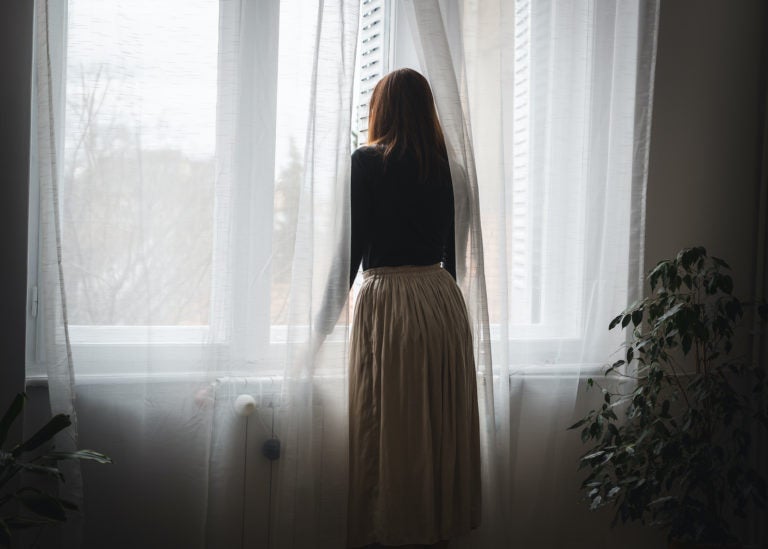Delaware domestic violence advocates report increased calls for help
Advocates for domestic violence victims in Delaware are adjusting how they provide services during coronavirus shutdowns.

(Bigstock/Mihailo K)
Some domestic violence victims in Delaware are now spending the night at their workplaces to avoid abusive partners who now work from home.
Many more have submitted Protection from Abuse requests to family court since last week.
Advocates for domestic violence victims say their clients are practicing these safety measures more than ever due to the coronavirus pandemic.
Over the weekend, Delaware Gov. John Carney joined governors in other states in issuing a stay-at-home order to prevent the spread of COVID-19.
While public health experts agree this is the best method to slow the pandemic, advocates say domestic violence victims are at greater risk for abuse as they’re forced to spend more time with abusive partners. While Carney’s order encourages domestic violence victims to find alternative places to live, that’s not always easy.
“We started seeing an increase in calls, not just in the volume, but the intensity in which clients call with distress levels,” said Elizabeth McCourt, chief health and safety officer for the YWCA of Delaware.
“What that limited quarantine has done is it forces the person being abused into a situation where they feel trapped,” she said. “A lot of times, the abuser was working outside the home or not always present, so (victims) were able to shift their schedules around to limit their exposure. But with the quarantine, that protection goes away.”
More than half of domestic violence victims stay with their partner because they don’t have financial independence. If they are unable to work because of business shutdowns, it compounds a victim’s need to rely on an abusive partner, McCourt said.
In addition, many services that are typically available to domestic violence victims are more difficult to access as organizations practice safe public health standards.
“About 20% are crisis intervention calls — a person has just been assaulted, and they need to report to police or go to a hospital. That remains the same,” McCourt said. “The only difference is, the thought of going to the hospital now really changes that perspective some.
“And even our police stations, many of them are closed to the public, so you can’t walk into one, which feels strange to somebody who feels like they need to rush there. They now need to make an appointment to report.”
Newark Police said its lobby remains open, however. Face-to-face interactions have been decreased because of the pandemic, but a person can pick up the phone in the lobby to talk to someone live. The department encourages women to call 911 or their local police station if “walk-in” options currently aren’t available in their location. Domestic violence victims also can text 911 if they can’t call.
The YWCA is still operating its 24/7 crisis hotline, but it’s shifted counseling sessions online. And while it’s still offering shelter, it’s not accepting any new residents, unless a resident leaves, based on CDC advice to reduce crowds. Advocates say more funding is needed so women’s shelters can open temporary facilities during the pandemic.
Delaware’s family court also received a spike in Protection from Abuse requests last week, said Lori Sitler, executive director of Delaware-based Child, Inc. Sitler, whose organization advocates for victims in court, believes the uptick is because victims feared those orders wouldn’t be available after the courts closed their doors.
In response to COVID-19, Child, Inc., along with the nonprofit Community Legal Aid, worked with family court to make these petitions available online while courts are closed.
“Necessity is the mother of invention,” Sitler said. “We are looking for ways to continue to support domestic violence victims filing these petitions.”
In fiscal year 2019, Delaware received 4,198 PFA petitions.
Sue Ryan, executive director of the Delaware Coalition Against Domestic Violence, encourages victims to continue practicing their personal safety strategies and to seek help when needed.
“One thing they can do as tensions rise is to go to a safe place in the house, and that would not be the kitchen, because there are potential weapons in the kitchen, nor the bathroom … If they have the ability, connect with family or friends,” she said, noting services are also available and hotlines are open.
“In a time like this, for a victim of domestic violence, it can feel especially isolating and terrifying when they’re stuck in their home with someone,” Ryan said. “You’re not alone. There is help available, even during this public health crisis. If they can get to a safe place, make a call.”
For Kent and Sussex Counties, call SAFE hotline: 302-422-8058
Hotline for Abriendo Puertas shelter for Spanish speaking victims: 302-745-9874
For New Castle County Shelters, call: 302-762-6110
For help with Protection from Abuse orders, call: 302-255-2609
WHYY is your source for fact-based, in-depth journalism and information. As a nonprofit organization, we rely on financial support from readers like you. Please give today.





![CoronavirusPandemic_1024x512[1]](https://whyy.org/wp-content/uploads/2020/03/CoronavirusPandemic_1024x5121-300x150.jpg)


